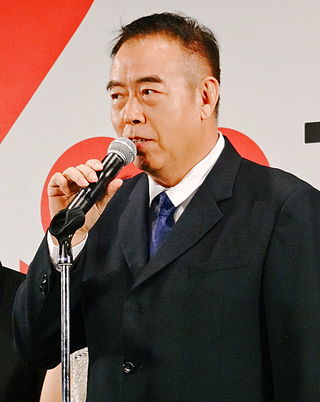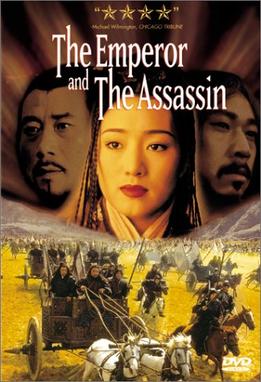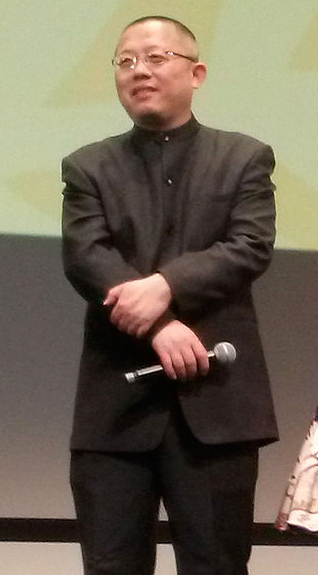Related Research Articles

Farewell My Concubine is a 1993 Chinese-Hong Kong epic historical drama film directed by Chen Kaige, starring Leslie Cheung, Gong Li and Zhang Fengyi. Adapted for the screen by Lu Wei, based on the novel by Lilian Lee, the film is set in a politically tumultuous 20th-century China, from the early days of the Republic of China to the aftermath of the Cultural Revolution. It chronicles the troubled relationships amongst two lifelong friends, the Peking opera actors Cheng Dieyi (Cheung) and Duan Xiaolou (Zhang), and Xiaolou's wife Juxian (Gong).

Chang Chen is a Taiwanese actor. He was born in Taipei, Taiwan. His father Chang Kuo-chu and his brother Hans Chang are also actors.

Chen Kaige is a Chinese filmmaker and a leading figure of the fifth generation of Chinese cinema. His films are known for their visual flair and epic storytelling. Chen won the Palme d'Or at 1993 Cannes Film Festival and the International Federation of Film Critics (FIPRESCI) Award in 1993 for directing Farewell My Concubine.

Trần Anh Hùng, born December 23, 1962) is a Vietnamese-born French filmmaker.

The Emperor and the Assassin, also known as The First Emperor, is a 1998–1999 Chinese historical romance film based primarily on Jing Ke's assassination attempt on the King of Qin, as described in Sima Qian's Records of the Grand Historian. The film was directed by Chen Kaige and stars Gong Li, Zhang Fengyi, Li Xuejian, and Zhou Xun. The film was well received critically and won the Technical Prize at the 1999 Cannes Film Festival. It was the most expensive Chinese film made up to that time, costing US$20 million.

Tsai Ming-liang is a Malaysian filmmaker based in Taiwan. Tsai has written and directed 11 feature films, many short films, and television films. He is one of the most celebrated "Second New Wave" film directors of Taiwanese cinema. His films have been acclaimed worldwide and have won numerous awards at festivals. In 1994, Tsai won the Golden Lion at the 51st Venice International Film Festival for the film Vive L'Amour.

Hou Hsiao-hsien is a retired Mainland Chinese-born Taiwanese film director, screenwriter, producer and actor. He is a leading figure in world cinema and in Taiwan's New Wave cinema movement. He won the Golden Lion at the Venice Film Festival in 1989 for his film A City of Sadness (1989), and the Best Director award at the Cannes Film Festival in 2015 for The Assassin (2015). Other highly regarded works of his include The Puppetmaster (1993) and Flowers of Shanghai (1998).

Jia Zhangke is a Chinese-language film and television director, screenwriter, producer, actor and writer. He is the dean of the Shanxi Film Academy of Shanxi Media College and the dean of the Vancouver Film School of Shanghai University. He graduated from the Literature Department of Beijing Film Academy. He is generally regarded as a leading figure of the "Sixth Generation" movement of Chinese cinema, a group that also includes such figures as Wang Xiaoshuai, Lou Ye, Wang Quan'an and Zhang Yuan.

The Center of the World is a 2001 American drama film directed by Wayne Wang and shot on digital video. It stars Peter Sarsgaard as a dot-com millionaire who hires a drummer/stripper to stay with him in Las Vegas for three days for US$10,000. The film was screened out of competition at the 2001 Cannes Film Festival.

Edward Yang was a Taiwanese filmmaker. He rose to prominence as a pioneer in the Taiwanese New Wave of the 1980s, alongside fellow auteurs Hou Hsiao-hsien and Tsai Ming-liang. Yang was regarded as one of the leading filmmakers of Taiwanese cinema. He won the Best Director Award at Cannes for his 2000 film Yi Yi.
Little Red Flowers is a 2006 Chinese film directed by Zhang Yuan. The film was a co-production between China's Beijing Century Good-Tidings Cultural Development Company LTD and Italy's Downtown Pictures. The Dutch company, Fortissimo Films handled worldwide sales.
Chen Shiang-chyi is a Taiwanese actress. She has appeared in most of Tsai Ming-liang's feature films.

Wang Chao is a Chinese film director and screenwriter, sometimes considered part of the loosely defined "sixth generation." Wang began his career serving as an assistant director to the fifth generation auteur, Chen Kaige, working with the elder director on epics like Farewell My Concubine and The Emperor and the Assassin. At the same time, he began to write fiction including several short stories and novellas, one of which would later go on to serve as the basis of Wang's directorial debut, The Orphan of Anyang.

King of the Children is a 1987 drama film directed by Chen Kaige and starring Chen Shaohua. The film was based on a novella of the same name by Ah Cheng. The film competed for the Palme D'Or at the 1988 Cannes Film Festival.

The 46th Cannes Film Festival was held from 13 to 24 May 1993. The Palme d'Or went to Farewell My Concubine by Chen Kaige and The Piano by Jane Campion.

Spring Fever is a 2009 Chinese/French film directed by Lou Ye. The production of the film is in defiance of a five-year ban on filmmaking imposed by China's State Administration of Radio, Film, and Television (SARFT) for his previous film, Summer Palace. Filmed in Nanjing, the film was described to be about a young threesome overcome with erotic longings.
The True Story of Ah Q is a 1981 Chinese drama film directed by Fan Cen. It was entered into the 1982 Cannes Film Festival. It is based on the 1921-22 novella of the same name by Lu Xun.

Anthony Chen is a Singaporean film director, screenwriter and film producer. He is known for directing the feature films Ilo Ilo (2013) and Wet Season (2019).

Chen Yi-wen is a Taiwanese filmmaker and actor.

Heartbreak Island is a 1995 Taiwanese drama film directed by Hsu Hsiao-ming. The film follows a recently released woman prisoner as she visits her ex who was arrested in the 1979 Kaohsiung Incident but released before her. The film makes extensive use of flashbacks to illustrate the woman's thoughts.
References
- ↑ "Festival de Cannes: A Confucian Confusion". festival-cannes.com. Retrieved 26 August 2009.